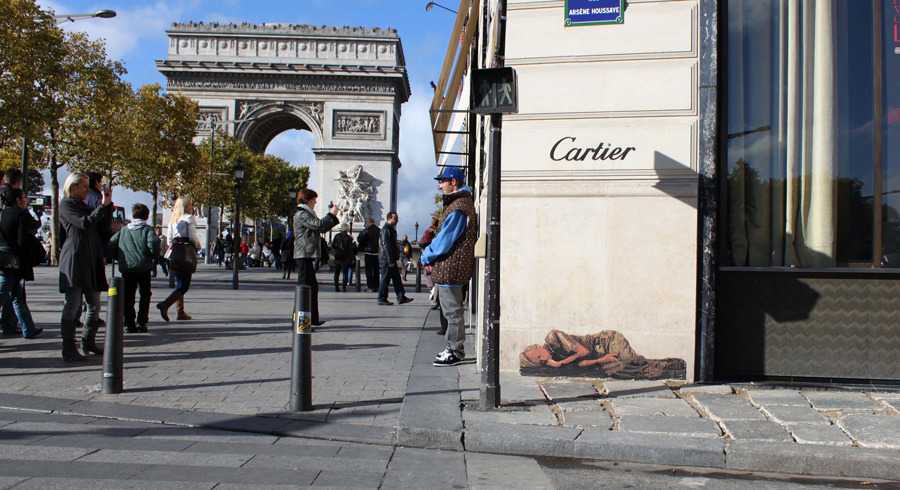
After a solo pilgrimage along France’s Le Chemin de St. Jacques—rarely certain where or even if I’d find a bed for the night—I returned to Paris to fly home. On my last late-October night, I stepped out for a pre-dinner walk. I passed two women wearing hooded black coats who stood motionless on a shaded street corner. One’s masked hood covered almost all of her face. The other’s pale, gaunt face was mostly visible. It appeared that a heap of backpacks stood beside them.
On my return, the two hadn’t budged. Perhaps they really were statues. I maintained my stride, but turned and looked at them directly. My eyes locked with those of the woman with the gaunt face. When I reached my hotel room, her face stayed with me. I had to go back to make a connection, if only to find out why they were there at dusk guarding a heap of backpacks.
***
In the preceding months, the knitting that bound together everything I called “me” had ripped and I’d fast unraveled. I told people I was going on a pilgrimage to engage in a prolonged act of contemplation. Secretly, I planned to lose myself and maybe not even come back.
Most pilgrims lived on the fly, carried their lives on their backs, had no idea where they’d spend the night. I refused to make reservations because millions before me accepted Que sera sera! There were some close calls. I spent one restless night cocooned in bubble wrap on the kitchen floor of a priest’s house.
***
As I approached, the two women didn’t flinch. The gaunt-faced one had removed her hood, revealing a clear complexion with no signs of excessive sun exposure usually observed in street people. The second woman, olive-complected, still wore a masked hood revealing only her eyes, nose, and hair-lined upper lip. What I’d mistaken for backpacks was a mammoth shopping cart stuffed with small suitcases, carry-ons, backpacks, and water bottles varying in size and fullness. I saw no scraps of food, no shopping or trash bags, no collection cup, plate, bowl, or box; no sign to explain who they were and why they were there. Instead of sitting on a step, portable chair, or ground, they stood like sentries. Neither reached out or made entreaties.
Both turned to me; neither cracked a smile nor spoke a word. When I said, “Bonjour,” they reciprocated. I asked if they spoke English, expecting “no” or radio silence. The younger answered, “Not so well, but I understand it and can speak it.” Up close, she looked about 30; the other, about 60. The younger’s partially-open coat revealed multiple layers. The elder’s coat resembled monk’s robes.
“I saw you standing here. I wondered why?”
The two conversed together, speaking in French, before turning back to me. The younger finally said, “I would like to introduce my mother. We are poor and homeless because circumstances resulted in our losing everything we owned except what you see here. Ask us questions, as you wish.”
I’d ask the daughter a question, she’d confer with mom, and eventually the daughter would answer. Occasionally, the two argued over my meaning, how to respond, or whether to dismiss my question. Now and then, the daughter warned, “You used a word that carries a different meaning in French than you probably intend. Would you like to rephrase your question?” As the conversation gathered momentum, she increasingly answered without conferring with mom, or asked, “Is that really the question you want to ask?”
After dancing around, I asked, “What caused your being thrown onto on the street?”
“Do you want a social answer or an individual answer?” she asked.
“Whichever, both if you like.”
She began offering a social explanation, then stopped. “You don’t need to know that to appreciate the circumstances that changed our lives.”
“You’re homeless now,” I said. “You live on the street. But you’re obviously university educated. You haven’t always been poor. You’ve known life’s comforts.”
“Correct. We had no idea what being poor felt like. Now, the street’s our bedroom.”
They began passing cigarettes with an insistence that belied the austere sense of control they’d shown earlier. I rationalized: a cigarette’s stinging warmth buffered them briefly from the cold. The daughter’s fingers were heavily stained by nicotine; grit crammed her fingernails.
“Smoking is expensive and one of the worst things for your health,” I said.
“But this is all we do. We don’t use drugs, we don’t even smoke cannabis.”
After 45 minutes, I tried handing her a 10 Euro note. After conferring with mom, she said, “We’re glad to talk with you. You don’t have to pay us to talk with us.” She lifted a water bottle from the cart, took a long sip, and passed it to mom.
Initially, I kept my eyes on the daughter, waiting for what she’d say next. During their back-and-forth, I didn’t look at mom. I suspect mom, likewise, only attended to her daughter. Gradually, mom and I began to focus on whoever was speaking. Then, we began looking directly at each other while listening to daughter’s voice in the background. I could understand mom better after she adjusted her mask so I could see her lips. The daughter’s role evolved into confirming what the mother and I had already come to understand.
The energy balance shifted. They began firing questions at me.
“What kind of work do you do?”
“Research on the health and well-being of children,” I answered.
“Medical research?”
“No, health risk behaviors like unprotected sex, carrying weapons, using tobacco.”
“Where do you look for inspiration? What books? Where else?”
“Most is government-funded. Little seems inspired.”
“What’s your academic field?”
“Psychology. What’re yours?”
“Knowing that won’t help you understand. You Christian?”
“I believe the divine resides in you and me. Religion should help us act compassionately, instead of causing disputes and wars. What about you?”
“We don’t believe in God and place no value on religion.”
“Where do you sleep? Where will you sleep tonight?”
“We often sleep on the street, probably will tonight. We’ll see.”
“Usually in the same part of the city?”
“No, we keep moving with no real plan.”
“Are there social service agencies that help provide shelter for the homeless?”
“Maybe, but that doesn’t address the underlying situation. The homeless stay homeless.”
“How will you get out of this situation? Winter’s coming.”
“Maybe we won’t.”
I said something about homelessness in America. They opened their eyes wide. She said, “We had no idea you were American. I thought there were no homeless in America.”
“Where’d you get that idea?”
“Rudy Guiliani said, ‘There are no homeless in New York.’”
“Rudy hasn’t been mayor for years. Anyway, he lied. There were 40,000 homeless in New York. He wanted to make them disappear so he took away benefits, as if that would force them to remedy their situation, as if it were that simple.”
“Are most of the homeless in New York?”
“No, they’re everywhere, especially cities. In Portland, there are lots of services. The problem is, it’s hard to find jobs and stop being homeless.”
“That’s what I’m saying. We once had a good life, but lost everything. Even if we could find jobs, how can we get back to any kind of life?” After a pause, she asked, “Why did you come back?”
“I’ve been away. I wanted to talk with someone.”
“Why us?”
“I saw your face.”
They looked at each other. “People stop and talk with us because they have a need. What is your need?”
“I came back to find out why you were here. I stayed because I could feel your, ‘Maybe we won’t.’”
“What did you feel?”
“When I walked in the mountains, I had no idea where I’d spend the night. Long ago, I had no place to live, so every night I slept in the forest. I came here because I feared losing everything, in a different way.”
“Are you’re saying you can feel what it’s like to have lost everything and have no idea how to rise above these conditions?”
“I can begin to understand, ‘Maybe we won’t,’ because I saw no way out either.” I shivered in shorts and t-shirt. I said, “I wish we had a fire!” meaning to say it to myself.
She said, “We need to move because it gets dangerous here during the night, especially for women.”
“Where’ll you sleep?”
“We’ll see.”
I reached out my hands and she held them in hers. As our hands warmed each other, I transferred 20 Euros into her left hand and closed her fingers tightly around it until her hand surrendered. Finally, the mother spoke and the daughter translated. “We accept your money and thank you. We will use it to buy food.” No translation was needed.
The daughter dropped an empty liter water bottle back into the shopping cart. The two began pushing it across Avenue Secrétan.
“Bon nuit,” were the last words we exchanged.

Excellent article. .VERY FEW OF US STOP TO talk to homeless people